#Hachijikan no kyôfu
Photo
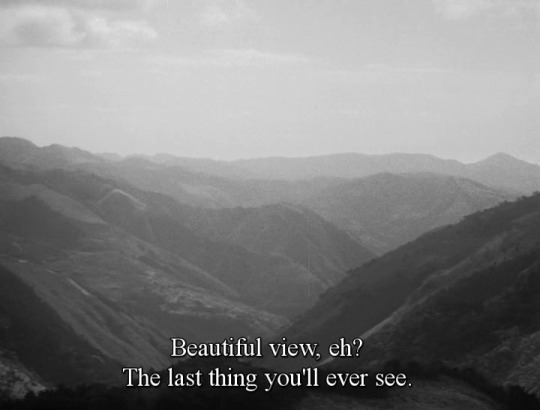
Eight Hours of Terror (Seijun Suzuki, 1957)
#Eight Hours of Terror#Seijun Suzuki#Suzuki#quote#mountain#mountains#beauty#1957#black and white#Hachijikan no kyôfu#Hachijikan no kyofu
470 notes
·
View notes
Photo










hachijikan no kyôfu / eight hours of terror (jp, suzuki 57)
6 notes
·
View notes
Photo


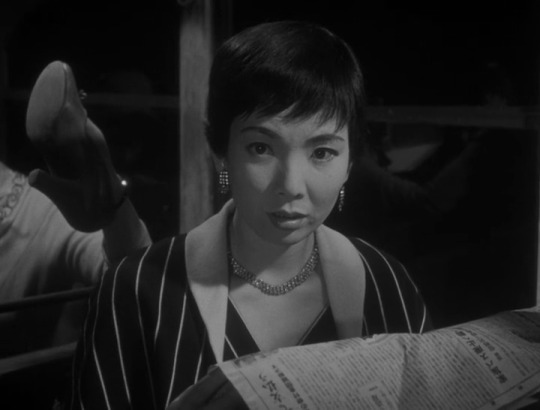
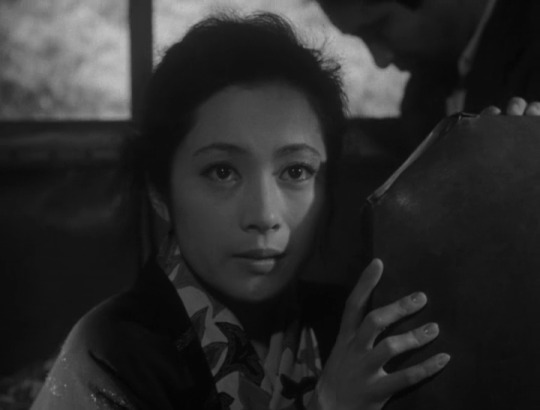

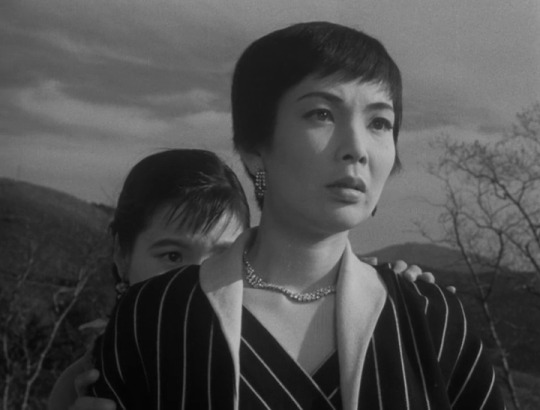

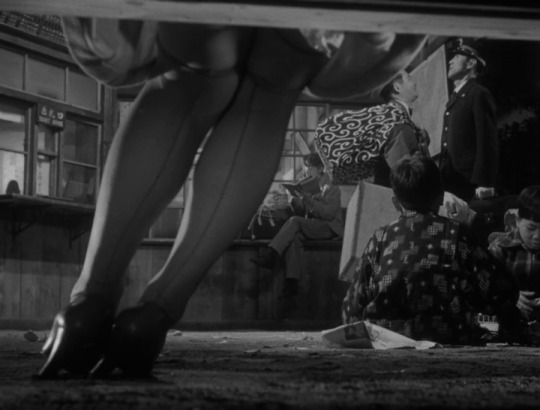
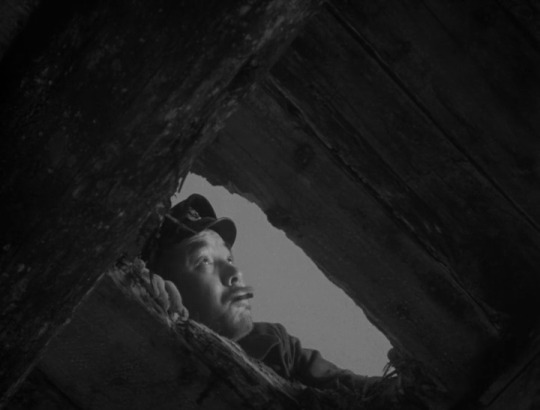
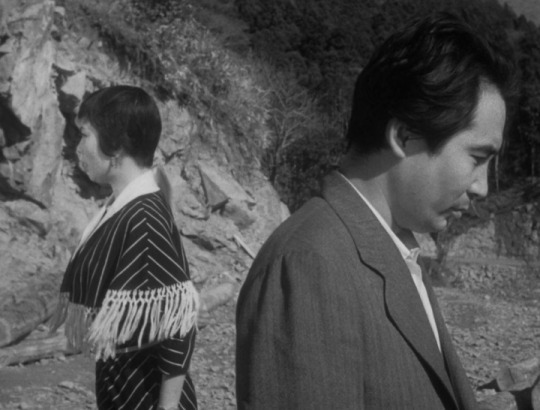
Eight Hours of Terror (Seijun Suzuki, 1957)
#films watched in 2023#Eight Hours of Terror#Seijun Suzuki#Suzuki#1957#seis#black and white#Hachijikan no kyôfu#Hachijikan no kyofu#Taizô Fukami#Hisako Hara#Nobuo Kaneko#Minako Katsuki#intrigue#thriller#legs#robbery
85 notes
·
View notes
Photo










hachijikan no kyôfu / eight hours of terror (jp, suzuki 57)
5 notes
·
View notes
Text
Mariocki's 2018 Top 5s
Top 5 films (previously unseen)
Hachijikan No Kyôfu (Eight Hours Of Terror, 1957). An entirely atypical Seijun Suzuki film, its basically The Lady Vanishes mixed up with The Wages Of Fear, all shaken about and told with Suzuki's unique blend of irreverence and humanity.
Die Blechtrommel (The Tin Drum, 1979). Volker Schlöndorff's adaptation of Günter Grass' seminal novel dispenses with much of the third act, making for a leaner, more coherent film. Magical realism walks hand in hand with the banality of evil in a visually stunning, difficult, funny and distressing film. Unique.
The Offence (1973). Sidney Lumet adapts a minor play and transforms it into a cinematic masterpiece. A gruelling, exhausting study of one man's destruction - or is it two men, or neither? In replaying the same scenes, with slight variations and a little more revealed each time, Lumet twists the plot and the characters until everything is either revealed or obscured - depending on your reading of events. Undoubtedly Sean Connery's finest performance.
Alice, Sweet Alice (1976). A cheaply made, independent slasher film - but so intelligently made, so thoughtfully put together, that to call it a slasher feels insulting. Full of symbolism, amazing visuals, and one of the most frightening knife attacks in all horror cinema.
The Shape Of Water (2017). The only time I ventured to the cinema this year, I think, and I was well rewarded. Guillermo del Toro's fairy tale is at once very modern and thoroughly old fashioned, a warm and rosy love letter to both Old Hollywood and modern love. Beautifully acted, directed, scored, costumed...
Top 5 films (rewatched)
Point Blank (1967). John Boorman tackles the familiar film noir tropes, only to pick them apart and produce something entirely new. Incredibly stylish, and towered over by Lee Marvin's amazing central performance as the inscrutable, unreadable, intense Walker.
A Man For All Seasons (1966). Robert Bolt adapts his own play, streamlining some elements and redistributing the Chorus to produce a powerful polemic on hypocrisy, politics, and ambition. Paul Scofield fully deserved his Oscar for playing More.
Butley (1974). Part of the American Film Theatre, Simon Gray's study of a verbose, embittered, drunken academic on the day his life falls apart, is both brilliantly witty and heartbreakingly sad. Alan Bates barely draws breath for two hours, but it doesn't drag for a second.
Night Of The Demon (Curse Of The Demon, 1957). Jacques Tourneur approaches the ghost story as film noir. Where the film suffers from special effects limitations of the time, it succeeds in producing an air of pure terror and suspense.
Operazione Paura (Kill, Baby... Kill!, 1966). A relatively tight and simple plot by Mario Bava's standards, but perhaps his most visually experimental film. Drawing on a wealth of sources, Bava weaves a gothic tale of dread in a lurid kaleidoscope of greens and purples.
Top 5 TV shows (new)
Sharp Objects (HBO). Had the audacity to tear me apart, then stitch me back together, only to tear me apart again. Truly one of the most impressive bits of television ever produced, perfect in design, casting, direction and every other aspect. I'm honestly not sure I've recovered from it yet.
Killing Eve (BBC America). Big, shiny, funny as hell, Gay ™, a brilliant cast work tirelessly to produce a show that works on multiple levels, all of them awesome.
Vic & Bobs Big Night Out (BBC). Its always a joy to have the dynamic duo back on tv, but to have them revisit some of their oldest and most beloved creations (The Man With The Stick! It's been nearly thirty years!!) felt very special. Undeniably an acquired taste, the pair are part of my childhood and nobody can do unbridled, joyful anarchy quite like them.
Derry Girls (Channel 4). Deeply funny, bitingly honest and at times truly moving. The young cast are excellent, and if you made it through the finale without a tear in your eye, you're a stronger viewer than I.
Doctor Who (BBC). Not, perhaps, the strongest series New Who has had - but Jodie Whittaker made, for my money, the strongest and most confident debut. She was The Doctor within seconds, and what the series might have sometimes lacked in depth and maturity it more than made up for with one of the strongest TARDIS teams the show has ever had, in New Who and Classic Who.
Top 5 TV shows (old)
The Fellows (Granada, 1967). Establishing itself as a formulaic, criminal-of-the-week crime show, about half way through this series creator Robin Chapman pulls the rug out from under the viewer, culminating in one of the most singularly impressive episodes of old telly I've ever seen - fifty minutes in which the two leads, irrevocably changed by a seemingly minor infraction, debate their own worth, the nature of crime, the relevance of justice and the very existence of evil. Spellbinding.
Callan (ABC/Thames, 1967 - 1972, rewatch). Was there ever a more anti-authoritarian series than this? Dispensing with black and white for shades of grey, and deep, dark shades of grey at that. Fantastic scripts, flawlessly cast, and with moments of genuine shock that will stay with you long after the series has finished.
Out (Thames, 1978). Trevor Preston shook off his association with children's television to produce this decidedly adult study of a career criminal deeply affected by his time in prison. Sticking rigidly to the 'show don't tell' school of storytelling, Preston slowly paints in the background to Tom Bells intense loner Frankie Bell, ending with a morose portrait of a man both damaged and damaging to those around him.
Mr. Palfrey Of Westminster (Thames, 1984 - 1985). Supported by scripts that are dense, literary, but often very funny, Alec McCowen makes Mr. Palfrey a truly unique figure in the world of spy fiction. Always witty, always clever, but sometimes devastating - like all the best TV should be.
The Nearly Man (Granada, 1974 - 1975). Unashamedly wordy scripts full of monologues and complex, barbed conversations. A fascinating insight into British politics in the 1970s, held together by Tony Britton's powerhouse performance as Labour MP Christopher Collinson - an arrogant, selfish, committed, honest, manipulative, courageous, decent bastard.
Top 5 books
Sense and Sensibility - Jane Austen. A lot funnier than I was expecting, quickly became my second favourite Austen novel. Considering we never really get inside his head, Brandon is a brilliantly realised, three dimensionsal character.
Selected Literary Criticism - D. H. Lawrence. I have a lot of issues with Lawrence, and almost as many with his writing, which is frustrating and irritating just as often as its beautiful and moving. His criticism, although far from perfect, is perhaps the best way to get to know the man behind the words - part genius, part raving zealot, insightful, clever, conceited and baffling.
To The Lighthouse - Virginia Woolf (reread). Light on plot, heavy on everything else, Woolf's masterpiece. Hauntingly beautiful, a semi-conscious daydream of a book which is about nothing much at all, but also what it means to be, what a soul is, and the nature of love.
The Dig - Cynan Jones. In style, Jones is the polar opposite of Woolf - short, clipped, without fanfare or decoration. At times an ugly book about ugly things, but there are moments of sheer joy - and of real shock.
Feet of Clay - Terry Pratchett (reread). What can I say? It's TP, and it's The Watch, a sheer joy. The man knew how to use words just right, so that you're laughing one minute, and the next you feel distinctly uncomfortable.
#top 5#2018#not sure why i did this?#probably more for my own reference#time... blurs#also i still don't know how to do read mores#so sorry for the long post
4 notes
·
View notes